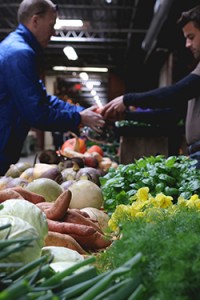Considering the enticing array of exotic foods that can be shipped to your corner grocery from around the world, why choose foods that are locally raised and grown? As it turns out, there’s a whole lotta reasons – and some of them may surprise you.
If your concern is the environment, you should know that even the top certified organic food that is shipped into RI from around the country doesn’t walk here by itself. By the time organics reach your grocer, multiple transportation vehicles have created a sizable amount of pollution along the way. Eating local helps to reduce carbon footprints.
Local foods have unexpected benefits when it comes to your health – raw, pollen-laced local honey can provide relief from seasonal allergies. The bees are collecting nectar from the very plants that are causing your symptoms, so when you eat the honey and ingest minute amounts of the allergen, it has an effect similar to that of a preventative vaccine. A tablespoon of local honey each day can alleviate the symptoms of pollen-related allergies. If you include local honey in your daily diet throughout the year, you may never need antihistamines for pollen allergies again.
Here’s another big plus: When you eat local, you are eating foods in season that have often been picked within 24 hours. While fruits and vegetables destined for the freezer are flash frozen when picked, produce that is shipped and sold as “fresh” has been in transit or cold-storage for days or weeks. This not only affects the taste, but also the nutritional value. Local seasonal foods are at the peak of their nutrient and flavor potential. They are also at their most abundant, which can help bring the cost down considerably.
 From a purely economic standpoint, giving your business to local growers makes sense too. According to the American Independent Business Alliance, each dollar you spend at locally owned businesses returns three times more money to your local economy than a dollar spent at a chain store – and almost 50 times more than buying from an online mega-retailer. This is a benefit we all can bank on.
From a purely economic standpoint, giving your business to local growers makes sense too. According to the American Independent Business Alliance, each dollar you spend at locally owned businesses returns three times more money to your local economy than a dollar spent at a chain store – and almost 50 times more than buying from an online mega-retailer. This is a benefit we all can bank on.
But wait, there’s more! Local foods help to create a sense of community. When you visit a farmers market, you become connected to the people who raise and grow your food. They all have stories and wisdom to share and are willing to answer any question. Bringing your kids to the market is a fun way to teach them about healthy foods. Browsing the colorful displays provides an opportunity for them to hear about sustainable agriculture and to understand where vegetables, eggs, milk and other produce come from. Local growers can tell you about the practices they use to raise and harvest the crops. When you know where your food comes from, it changes the way you see it. I remember being a guide at a city farm, where urban kids on their first field trip were astonished to find that they could pick a piece of leafy kale off of a plant in the ground … and eat it! It was the first time many of them realized that food comes from the earth, not the aisles of a supermarket. One little girl, thrilled with her new experience, pointed to my white dog with black spots and asked quite seriously, “Is that a cow?” You don’t know what you’ve never been exposed to, and the early education that our children gain about nutrition and where their food comes from (not dogs) can affect their food attitudes for life.
So, are there any disadvantages of buying local? Well, sometimes local food can be more expensive. And buying it can require a special trip to the farmers market, a problem in a time crunch. Local foods also spoil faster because they are not laced with the preservatives that can keep transported produce in a state of suspended animation for many days. And you may not find as many varieties as you’d find in a chain store – no dragon fruit, cherimoya or Japanese pears. However, you can also rest assured that you will find no banned pesticides or South American spiders, either — things we can all live without.
The bottom line? If you are green minded, health conscious and concerned about your own community, eating local is the way to go. Supplement with Twinkies at your own risk.



